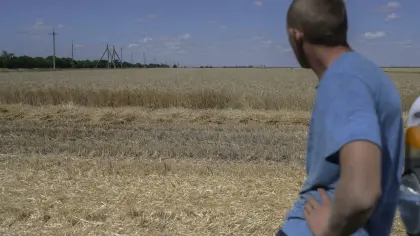Rakhmon Mirzoyev watches on as a combine harvester empties a steady stream of grain into a waiting truck on his farm some 60 kilometres (35 miles) from the frontline in southern Ukraine.
Recent good weather means the wheat yield this season has actually been better than normal — but for Mirzoyev that just presents another problem.
JOIN US ON TELEGRAM
Follow our coverage of the war on the @Kyivpost_official.
Since Russia’s invasion of its pro-Western neighbour on February 24, Moscow’s blockade of Ukrainian ports has trapped in storage millions of tonnes of grain from this fertile region that were meant to have been shipped around the world months ago.
Now Mirzoyev, 60, is struggling to work out what to do with his new harvest as silos around are already running low on space and local prices have collapsed.
“There is nowhere to put it and no one to sell to,” says Mirzoyev, who built up his small farm after moving to Ukraine 30 years ago from Tajikistan in Central Asia.
That means he is left anxiously waiting for a deal between Ukraine, Russia and Turkey to hammer out a United Nations-backed plan to lift Moscow’s blockade.
Ankara said an agreement between the sides would be signed on Friday in a first major accord between the warring sides since Moscow’s invasion in February.
“We don’t have any other choice — we have to hope something works,” Mirzoyev said.
But he is deeply sceptical that Russian President Vladimir Putin will live up to any promises to let exports resume, as he looks to keep up pressure on Kyiv almost five months into his brutal war.

Trump’s 90-Day Foreign Aid Freeze Won’t Apply to Ukraine Military Funding, Pentagon Assures VOA
“To be honest, personally I don’t really believe it will work out. But then what? We just have to throw away all the grain?”
– Risk of fires –
Russia’s naval blockade in the Black Sea has sparked a global food crisis that has sent prices soaring and sparked fears of famine.
Up to 25 million tonnes of wheat and other grain has been trapped in Ukrainian ports by Russian warships and landmines Kyiv has laid to avert a feared amphibious assault.
Like other farmers around the region, Mirzoyev has held off as long as possible to collect his wheat in the latest harvest in the hopes that the situation might change.
But baking sun in the past few weeks and almost no rain has ratcheted up the threat of another risk in this area still threatened by Russia’s long-range rockets — fires.
Mirzoyev points to a smoky haze lingering on the horizon over a nearby farm.
“A missile struck over there and the fields were burning for three days straight,” he says.
– ‘Can’t trust Russia –
Ukraine and its European allies have pushed to bolster deliveries from the region by train, road and up the river Danube by barge.
But farm truck driver Volodymyr Muzechuk tells AFP those routes are in no way sufficient to shift all the grain and a sharp rise in the price of fuel makes them prohibitively expensive.
“But war or no war, we still have to collect the wheat,” he says.
Like his employer, he also finds it hard to believe that the Kremlin will ever let the grain leave — even if a deal is struck.
“You can’t trust what Russia says. The only way to deal with them is through force,” he insists.
“They are terrorists.”
You can also highlight the text and press Ctrl + Enter










